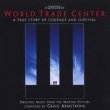BUY THE CD:
|


|
|
|
SYNOPSIS:
| |
two port authority police officers become trapped under the rubble of the world trade center.
|
|
|
MOVIE FACT:
| |
george clooney turned down the role of sgt. john mcloughlin.
|
|
|
RATING:
|


two out of four possible stars
|
|
|
|
Despite Oliver Stone's penchant for creating lengthy films filled with conspiracy theories and political statements, with World Trade
Center, he presents a surprisingly restrained view of the days surrounding the terrorist bombings in the United States in 2001. But in presenting a more "human interest" directed film, has Stone created instead a standard "triumph over disaster" film that might have been at home as a movie-of-the-week? While there are moments in the film that might make you think of a presentation on the Peacock or the Eye, the film still plays well on the big screen (as disaster movies tend to do).
The movie is much more of a dramatic film about "regular people" and their involvement in extraordinary circumstances than any sort of expose on what did or did not happen on September 9th, 2001. And in leaving [most] of his politics at the door, Stone has created a much more basic dramatic story than one would expect concerning two New York City Port Authority police officers and their hours spent underneath the rubble of one of the collapsed Twin Towers. And at first glance, the involvement of star Nicholas Cage in the film might make you think it's going to be a sensationalistic affair, but Cage handles the requirements of being part of an ensemble cast well.
Since it's Cage's face (playing Port Authority officer, "John McLloughlin") that the audience first sees in the theatrical trailer, you might think the film is based solely on his character, but he's not on the screen for much of the film and when he is, he's sharing it with fellow trapped police officer, "Will Jimeno," played by Michael Pena. Also featured prominently are the families of the trapped officers and a few sub-plots related to the disaster. Maria Bello has one of the most prominent roles (as Donna, Cage's wife), though it's possible audiences will be too distracted by her eyeballs to accurately focus on her performance.
For reasons that couldn't possibly have any believable explanation, Maria Bello wears the most vivid, bright blue contacts that completely overpower not only her face, but everything in the frame with her when she's on screen. Perhaps the person her character was based on had a penchant for startlingly colored contacts or maybe she had bright blue eyes that Maria Bello and the filmmakers wanted to accurately portray on screen... But whatever their reasoning, her eyes are so obviously filled with big thick contact lenses that it's hard to concentrate on her words whenever the camera's close on her face.
But enough on the superficiality of contact lenses... Or, perhaps the fact that something so trivial could take my attention away from the drama at hand is a sign of the film's failure to completely and utterly whisk the viewer away to the events portrayed. Despite a few stand-out performances, the film's overall impact isn't as shocking or memorable as it should be for the entire course of the film. More than once it's is necessary to focus on the visual, non-human elements of the film to find its value as a worthy big-screen experience. Branding the entire film as a "movie of the week" would discount the important struggle of the people upon which the movie is based, but watching the film isn't an effortless experience.
And while a movie with this type of recent, real-life subject matter shouldn't necessarily be "easy," as a film it should still keep you from glancing at your watch or noticing things like eye color and contacts. And given the film's quite respectable length (especially for director I-Love-Long-Films Stone), there isn't an overabundance of reels that would make glancing at your watch a past-time. But the fact that there are a few instances where the surface of the film becomes noticeable over the personal, real-life story presented is a (though minor) difficulty in the film's presentation.
Benefiting from a healthy budget of sixty-plus million dollars, the production values are what one would expect, though the actual event of the Twin Towers collapsing is presented in a rather interesting way. As an audience member, you will experience the collapses through the eyes and ears of the policemen who become trapped at the site. There are a few news-clips of the actual event shown over the course of the film, but much of the "experience" is displayed through audial means and through the expressions of the characters. Instead of showing a large-scale computer-simulated impact, the filmmakers choose instead to show the ominous shadow of a low-flying plane floating over the cityscape.
Almost like the way a horror or suspense film relies on sound effects and mood to create tension, the booming sounds and aftershocks of the Twin Towers' collapse is presented through the secondary means of personal experience and ear-thumping bangs. And since the story is presented small-scale, through the eyes of those who lived through the events, the strong performances should allow those large rumbles and sounds of destruction to resonate loudly in most viewers psyche.
Audiences should benefit the combination of a memorable story laid upon a series of extraordinary events, with the history of first-hand experience taking the stage instead of a radically politicized story. This is not a film that should conjure up discourse on the conspiracy theories surrounding September 11, 2001, but rather it showcases a deserving story of something extraordinary in the face of events so extreme.
Review by Kelsey Wyatt.
| |
|